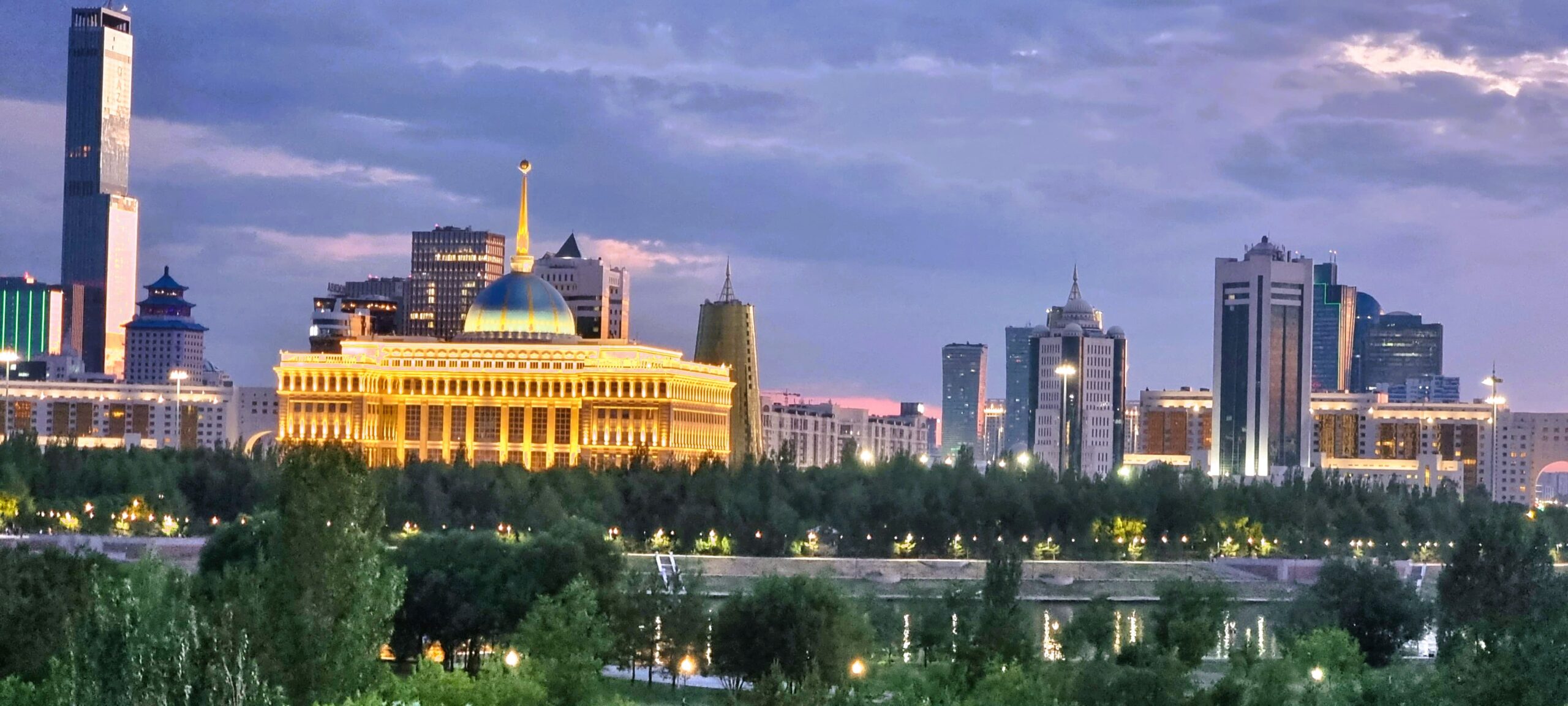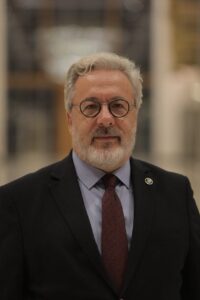In the age of communications and mobilities, cultural and religious characteristics of people have become increasingly visible and influential in global relationships. International relations discourse is allocating growing space to faith and culture-based issues.

Astana. Photo credit: The Astana Times/ Aiman Nakispekova.
The moral, ethical and spiritual values that govern human relations, such as mutual respect, tolerance, understanding, and cooperation, which are essential to all religions and faith systems and enshrined in international Charters, are being contextualized to build a peace culture. The idea of a pluralistic worldview emerged as a key means and a flexible tool facilitating interactions between peoples. In this world climate, the central role of religions and their leaders as promoters of inter-faith and intercultural understanding becomes all the more prominent. In multilateral forums and bilateral meetings held over these past decades, the leaders and representatives of world and traditional religions have underscored the importance of mutual understanding and conducive exchanges between different faith communities as a vital necessity for the present and the future.

Mahmud Erol Kiliç
At the outset, the foremost objective of interreligious cooperation was to correct the prevalent suspicions, negative biases, antagonisms, and misinformation about different faiths and cultures. Removal of the barriers posed by prejudice and misinformation was pinpointed as a precondition for countering extremism and fanaticism and eliminating faith-based and culture-based discords.
This reflection gained momentum after the publication of Huntington’s well-known “clash of civilizations” thesis in 1993, its expanded editions that followed the wars during the 1990s, and the ensuing literature. As a response, interreligious and intercultural dialogue was formalized more emphatically in international platforms at the turn of the century, to protect an atmosphere of peace and counter the clashing arguments, with the realization that these claims were fraught with dangers, including the risk of theoretically normalizing antagonism and extremism.
The recognition of interfaith and intercultural dialogue as a potentially effective framework for solving these problems has convened religious and spiritual leaders from around the world in forums of different scales, some of them also enlisting parliamentarians from various countries.
The crucial role and responsibility of religious leaders in promoting peace and welfare was also recognized by intergovernmental organizations. The UN Alliance of Civilizations (UNAOC) was established in 2005. The Organization of Islamic Cooperation (OIC) proposed the concept of Dialogue Among Civilizations to the UN General Assembly in 1998, as a cultural response of the Muslim world to the thesis of clash of civilizations and included the goal of “promoting dialogue among civilizations and religions” in its 2006-2025 Plan of Action. Incorporation of these topics in international agendas brought together growing numbers of leaders and scholars of different religions, policy makers, civil society, cultural institutions, academics, and media experts.
The OIC and its cultural subsidiary, the Research Centre For Islamic History, Art and Culture (IRCICA), were among the first international organizations to take part in these platforms toward these objectives. With this mission, IRCICA has followed with interest the convening of the Congress of World and Traditional Religions by Kazakhstan in 2003 and its follow-up processes.
The Congress was one of the first State-led initiatives of its kind in this century and also institutionalized itself as a periodical forum. Accordingly, seven congresses were held every three years by 2022 inclusive.
The seventh Congress of Leaders of World and Traditional Religions chaired by President of Kazakhstan Kassym-Jomart Tokayev, held on Sept. 14-15, 2022, was attended by the Grand Imam of Al-Azhar Sheikh Al-Tayeb and the Catholic Spiritual Leader Pope Francis (the signatories of the Document on Human Fraternity for World Peace and Living Together, Abu Dhabi, 2019) together with the spiritual leaders of world and traditional religions, heads of international organizations – including myself on behalf of IRCICA, scholars, public figures, and representatives of religious and cultural institutes in various countries.
In my view, the seventh Congress was a momentous forum that reflected the advancement of interfaith dialogue achieved by then from various viewpoints, including the number of religions and spiritual traditions represented, the coverage of relevant topics, and the adoption of a comprehensive Declaration, followed by the Development Concept for 2023-2033.
Around the same time, the importance of promoting interfaith and intercultural dialogue as a precondition for peace and welfare was reaffirmed by the OIC Hybrid Seminar: Connecting Further at the Post-Covid-19 Contemporary World: Enhancing Dialogue between the Islamic World and Other Great Civilizations convened at the OIC General Secretariat (Jeddah, Kingdom of Saudi Arabia) on Oct. 10, 2022.
The seminar was addressed by religious scholars from all continents and by organizations including IRCICA, UNAOC, the Council of the European Union, and King Abdullah bin Abdulaziz International Center for Interreligious and Intercultural Dialogue (KAICIID).
The OIC’s responsible organ in this field, IRCICA, offers a noteworthy example of activity programs implemented to translate the goals into effective actions. IRCICA endeavors to promote mutual understanding and affinity between the OIC-IRCICA member countries and other peoples of the world by producing scholarly information and references about their histories, arts, and cultural heritage, creating multicultural platforms of exchanges, joint studies and work sharing over specific philosophical, artistic, archeological, and other themes that would introduce peoples to each other.
These events and activities are conducted in cooperation with governmental and non-governmental institutions of the 57 OIC-IRCICA Member States and other countries. Many of them are considered within cultural diplomacy and development cooperation and can be quoted as examples of practical work in this sphere.
Some recent examples of IRCICA’s collaborative projects with Kazakhstan are noteworthy. The joint publications based on assets of the written cultural heritage and works of religious scholarship, including manuscripts and printed works on Islamic religious and historical literature include the catalog of the Book Collection in Arabic Script of the Kazakhstan National Center for Manuscripts and Rare Books prepared by experts from the National Center and IRCICA, published in 2022; the book-album titled “Epigraphic Monuments in Arabic Script from ‘Abat-Baytaq’ Necropolis” resulting from a joint project with Aktobe administration and Suleimenov Institute of Oriental Studies, published in Almaty, 2023, launched with an International Workshop held at Aktobe Regional University named after Zhubanov in 2024; the book titled “The Golden Horde in the Works of Ottoman Historiography (16th–17th Centuries)” containing excerpts from historical sources reflecting the religious scholarship developed, published in Astana, 2023.
We also jointly organized academic meetings, such as the two International Conferences held in Turkistan, Kazakhstan on “Sustainable Tourism, Pilgrimage, and Sacred Heritage: The People Protecting Monuments – The Legacy of Ahmed Yasawi” (organized by the Government of Kazakhstan, Turkistan administration and IRCICA, on Oct. 26-28, 2022) and “Reassessing the Heritage of Khoja Ahmed Yasawi” (organized by the State Historical and Cultural Museum-Reserve Aziret Sultan – Ministry of Culture and Information of Kazakhstan, and IRCICA, on Oct. 10-11, 2023).
Furthermore, IRCICA also works to reinforce interfaith and intercultural acquaintances in the context of its cooperation with international organizations. An example of IRCICA’s work on spiritual diplomacy is the lecture titled “The Mystical Philosophy of Islamic Calligraphy as a Theme for Art Education” which I gave during the UNESCO World Conference on Culture and Arts Education held in Abu Dhabi, U.A.E., on Feb. 13-15. These are operational examples of the link between the theoretical frameworks and dialogue platforms of interfaith and intercultural relations on one hand, and on the other, the possible grounds of practical action operable in their contexts, which can be multiplied and diversified to apply in many other cultural and educational areas.
Partnerships between organizations and institutions engaged in the field of interfaith and intercultural dialogue, their participation in each other’s events, are important components of the overall dialogue process. The aim of strengthening partnerships between the Congress and other organizations and platforms is mentioned in the Development Concept among the priority areas of activity and mechanisms envisaged for the implementation of the Congress Declaration.
A concrete example of its realization was the round table on the “Significance of the seventh Congress of the Leaders of World and Traditional Religions and the Congress’ Declaration” organized by Nazarbayev Center for Development of Interfaith and Inter-Civilization Dialogue, the main coordinating body of the Congress, and IRCICA, held in hybrid format at IRCICA headquarters on April 26, 2023 with the participation of authorities and experts representing different faiths and spiritual traditions around the world.
The event contributed to raising international awareness about the Congress and its Declaration among cultural and academic audiences.
A remarkable feature of the presently intensified global process of interfaith and intercultural dialogue is the extent of subjects covered and the increasingly proactive, problem-solving approach. This was also reflected through the Seventh Congress of Leaders of World and Traditional religions, which addressed a large number of practical issues alongside spiritual and theoretical ones, such as the countless threats to peace and economic welfare; social and educational issues; extremism, xenophobia and human rights abuses, poverty and underdevelopment.
This extension of the thematic range is also observable in the context of the relevant international organizations, including the UN Alliance of Civilizations and OIC-IRCICA. In addition to the founding motives sought since the beginning – protecting religious and cultural rights of peoples, correcting prejudices and filling gaps of information about the religions, the forums are now covering a much wider agenda of real-world issues, with a view to promote cooperation and solidarity between peoples for tackling all kinds of common challenges. This proactive engagement is also formally affirmed, as in the context of the International Conference on the theme From Religious Freedom to Religious Responsibility: Building Communities of Advocacy and Action organized by Doha International Center for Interfaith Dialogue and the Multi-Faith Neighbors Network, U.S.A. (Doha, May 9-11, 2023).
The work of institutions dedicated to promoting interfaith dialogue and the assemblies of religions’ leaders, state representatives, international organizations, and professionals from various sectors are indicating that the inter-faith sphere and the inter-governmental sphere can jointly operate on diversified agendas of progressive action towards common objectives in various areas.
The idea of addressing the problems and implementing programs of action through the combined efforts of religious communities and international organizations offers new prospects for the world community. The evolution of interfaith and intercultural dialogue outlined here has been generated by the interplay of global developments and the forums’ own dynamics empowered by the States, the leaders of the religions and spiritual traditions, and the organizations taking part. In this expanded conception of its purview, interfaith and intercultural dialogue is both an aim and a channel mobilized for peace, development and problem solving. Throughout this analysis, the vital, indispensable role of the leaders of religions and traditions is clear.
I would like to conclude by reiterating our support of all the praiseworthy initiatives to reinforce interfaith and inter-civilizational dialogue. On this occasion, I wish for the successful realization of the Congress’ Development Concept.
The author is Professor Dr. Mahmud Erol Kiliç, Director General, Research Centre For Islamic History, Art and Culture (IRCICA), Istanbul, Türkiye.

